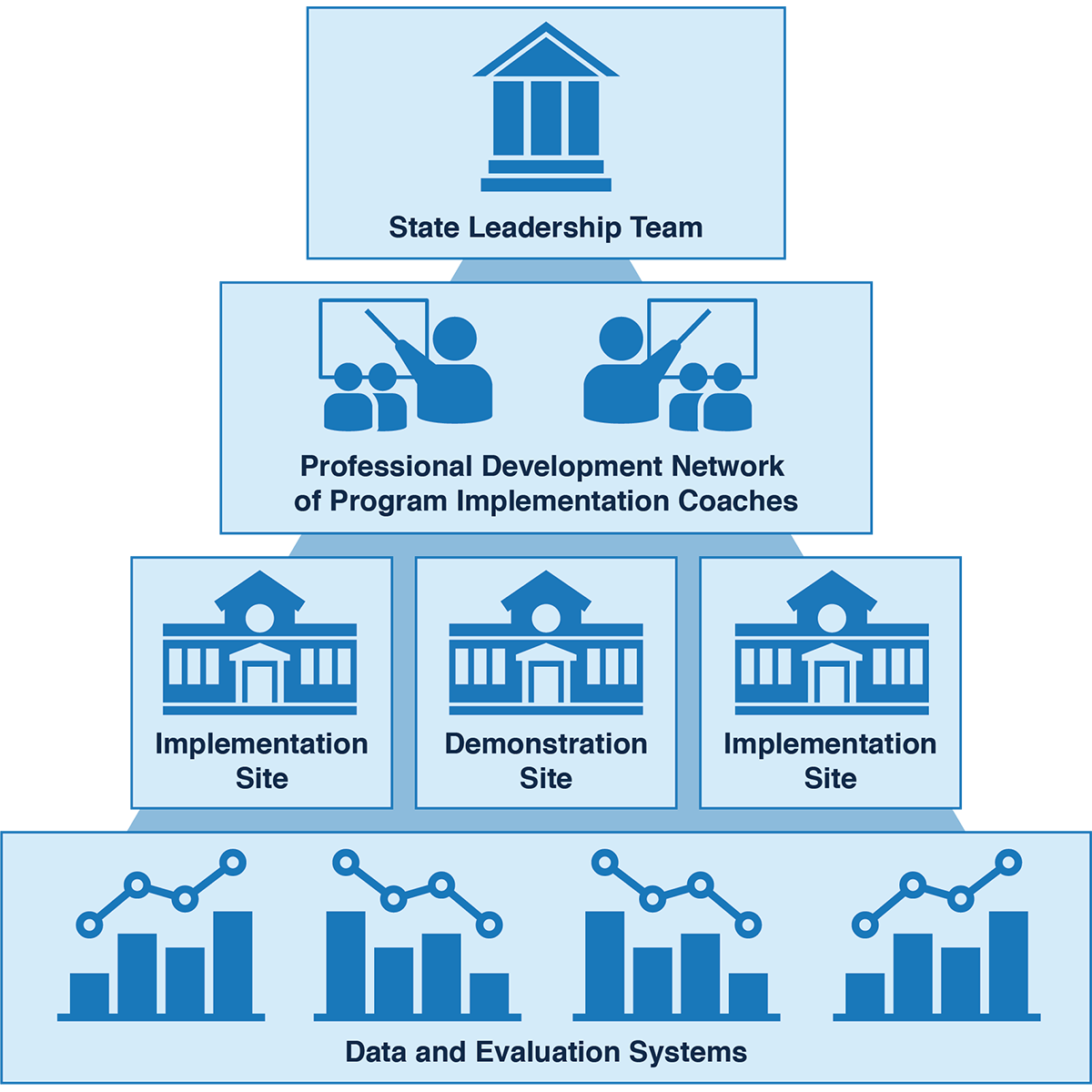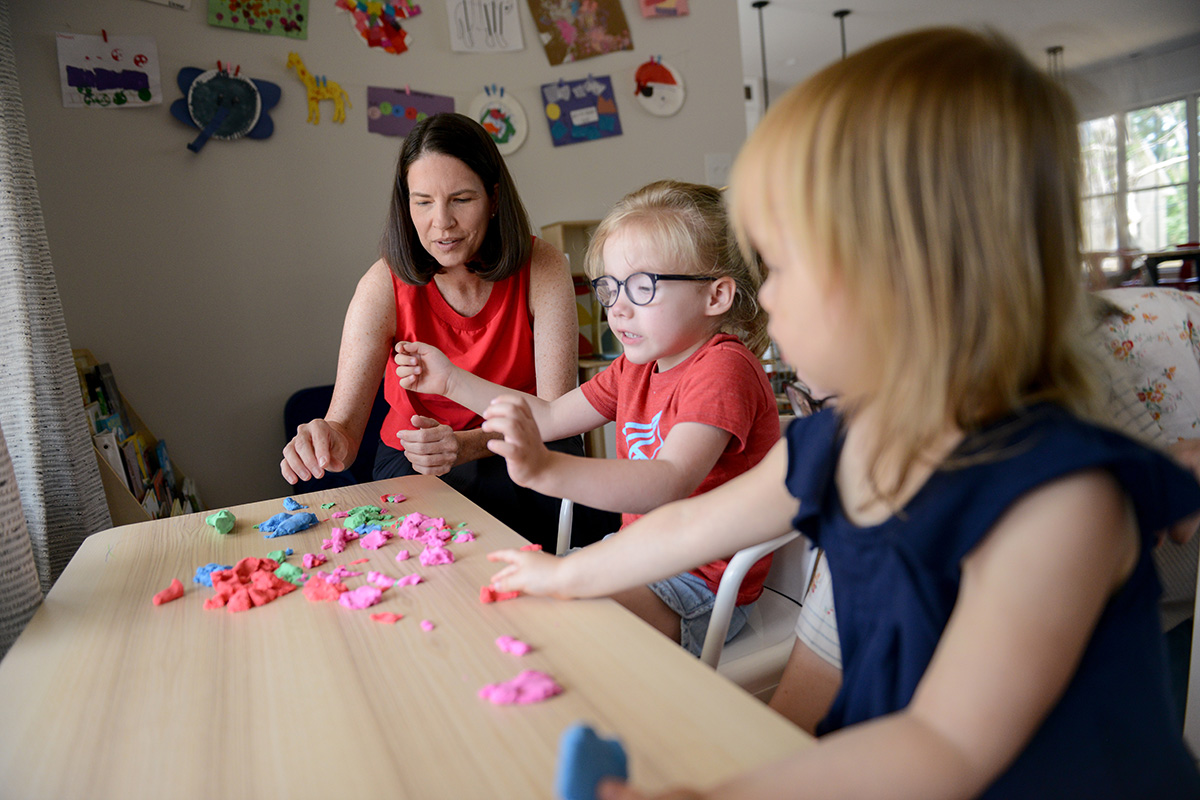A Journey to More Inclusive Classrooms: ECTA's Partnership with Illinois
April 16, 2024
In 2019, the Early Childhood Technical Assistance Center (ECTA) invited states to participate in a technical assistance (TA) process to help build their capacity to implement, scale up, and sustain high-quality inclusive policies and practices for children age 3–5 with or at-risk for disabilities. The Illinois State Board of Education along with the preschool inclusion initiative Early CHOICES accepted the invitation to receive two-years intensive TA to establish inclusive classrooms.
The Journey
The Indicators of High-Quality Inclusion and the principles of implementation science guided the partnership between ECTA and Illinois. The TA process began November 2019 and helped Illinois establish and use the following essential support structures for implementation and scale-up.
Essential Support Structures for Statewide Implementation

- State Leadership Team (SLT) makes collaborative decisions to build state capacity related to high-quality inclusion. It has 15 members and meets monthly.
- The Professional Development Network of Program Implementation Coaches builds workforce capacity and supports local implementation in inclusive early care and education environments (ECEE).
- Community Inclusion Leadership Team (CIT) with a Program Coach builds community awareness of the importance of early childhood inclusion by bringing together service providers and families. Illinois has three CITs: Collinsville, Mannheim, and Springfield districts.
- The CIT establishes three implementation sites using the Local Program and Early Care and Education Environment Indicators of High-Quality Inclusion.
- The sites offer critical teaching practices to maximize the access, meaningful participation, and developmental outcomes of young children with disabilities. Implementation sites become demonstration sites based on performance.
- Data and Evaluation Systems used by the SLT, CIT, and coaches result in intended outcomes being reached.
Program Impacts as a Direct Result of TA
Organization

- The CIT establishes three implementation sites using the Local Program and Early Care and Education Environment Indicators of High-Quality Inclusion.
- The sites offer critical teaching practices to maximize the access, meaningful participation, and developmental outcomes of young children with disabilities. Implementation sites become demonstration sites based on performance.
ECTA helped Early CHOICES use the TA to support their sites. Staff used implementation science principles and resources to structure the work, develop action plans, and gain state partner buy-in. While TA support strengthens state and local systems, successful implementation benefits all parts of the work. As a result, Illinois' programs focused more on practice-based coaching. The TA supported accountability and the commitment to include families on the CIT.
Community Goals Achieved
Collinsville
The Collinsville CIT developed news releases, a Facebook page, and a video on preschool inclusion as part of their awareness campaign. Noteworthy outcomes include:
- an itinerant preschool special education teacher from the district for Head Start classrooms.
- additional inclusive preschool classroom in the district supported by the Preschool Coordinator.
Next steps include collaboration with a local childcare center on inclusive special education services and development of a professional and parent resource guide.
Mannheim
Mannheim had the supports to build an inclusive system. They included a professional learning community based on the Inclusive Classroom Profile (ICP)™; training; and collaboration with another TA project. The TA supported:
- Franklin Park 84, a neighboring district, to join the CIT.
- collaborative district discussions to explore how to serve children in community childcare centers with the special education cooperative and EI providers. The community has no Head Start grantees.
Springfield
Springfield had a collaborative agreement to increase inclusive practices, yet the CIT was established through the TA process. This team has used the Preschool Inclusion Toolbox to increase knowledge and use of inclusion strategies. The CIT:
- developed a vision statement that promoted preschool inclusion community wide.
- launched a resource guide and community campaign.
- developed an implementation plan and organized monthly meetings to re-visit the plan and share updates.
Next steps include expanding inclusion in the local Head Start and expanding inclusive opportunities for children and their families at the K–5 grade levels.

Image courtesy FPG Child Development Institute
Other Program Impacts
Performance
Since TA began, Mannheim and Springfield districts reported a higher percentage of students receiving special education services in inclusive classrooms (Indicator 6A). For students receiving special education services outside the classroom (Indicator 6B), Springfield has shown significant progress. There has been a marginal decline in progress in Mannheim, and Collinsville's performance remained the same or declined, presumably due to COVID.
Funding
With the essential supports in place and a clear pathway to success outlined, Illinois state representatives applied for and received the Preschool Development Grant (PDG) to continue this work in Collinsville and two new communities. Illinois will apply for an implementation grant after the planning period. The scale-up communities are receiving other funding to support the CITs.
Continuation and Scale-up
The PDG, Early CHOICES funding, and TA support the new CITs. The Collinsville, Mannheim, and Springfield communities will establish demonstration sites to foster scale-up to other programs within and outside these districts.
- Collinsville is partnering with a childcare center in their catchment area.
- Two additional communities are engaged through an application process. The districts are meeting across systems, school districts and providers to expand the itinerant model.
- Springfield is continuing to scale-up and expand to other local programs.
- Mannheim is prioritizing the work at the program level, as there is no Head Start or group childcare in the district to build partner buy-in and expand.
Accountability and Information Sharing
TA evaluation data indicate that the SLT valued the TA process for helping to organize the work and being accountable in meeting action plan milestones. Likewise, the TA process and strategies helped the CIT share information across districts. This shared learning fostered direct and indirect partnerships and interactions across communities.
Key Takeaways
Inclusion depends on a shared vision that is upheld by strong collaborative relationships across sectors and a strong commitment, at all levels within an organization, to implement high quality, evidence-based practices. Illinois has identified the following lessons learned.
- The state had an established commitment to inclusion and therefore built their successes upon existing work in all three community sites.
- Technical and financial support are critical to long-term success. Continuous progress would be difficult without the commitment of these resources.
- Relationship building is a process that takes great time and energy. There are no shortcuts to building relationships that are the foundation upon which inclusive systems are built.
- Strong leaders willing to use their decision-making power is necessary for inclusion to work.
- Inclusion is individualized; there is no one-size-fits-all model. State and local supports must be generic enough to help all districts engage yet customized to meet each district's needs.
SLT Next Steps
- Strengthen family engagement and early childhood provider representation on CITs.
- Help CITs develop sound policies and procedures for peer learning.
- Establish demonstration sites to expand inclusive classrooms to other local programs.
- Scale up to other districts that want to take the journey to more inclusive classrooms.
Suggested Citation
ECTA Center (2024). ECTA's Partnership with Illinois: A Journey to More Inclusive Classrooms. https://ectacenter.org/about/impact-2024-inclusion.asp

